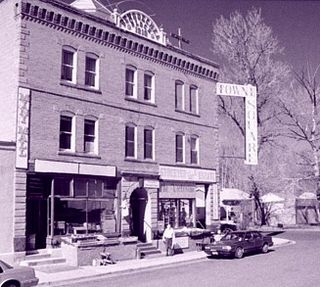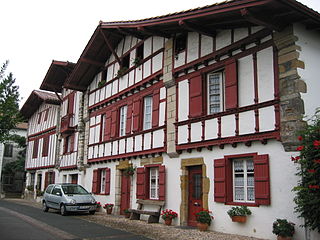The Basques are a European ethnic group, characterised by the Basque language, a common culture and shared genetic ancestry to the ancient Vascones and Aquitanians. Basques are indigenous to and primarily inhabit an area traditionally known as the Basque Country, a region that is located around the western end of the Pyrenees on the coast of the Bay of Biscay and straddles parts of north-central Spain and south-western France.
Spanish naming customs are historical traditions for naming children practised in Spain. According to these customs, a person's name consists of a given name followed by two family names (surnames). Historically, the first surname was the father's first surname, and the second the mother's first surname. In recent years, the order of the surnames in a family is decided when registering the first child, but the traditional order is still largely the choice. Often, the practice is to use one given name and the first surname only most of the time, the complete name being typically reserved for legal, formal, and documentary matters; however, both surnames are sometimes systematically used when the first surname is very common so as to get a more customized name. In these cases, it is even common to use only the second surname, as in "Lorca", "Picasso" or "Zapatero". This does not affect alphabetization: discussions of "Lorca", the Spanish poet, must be alphabetized in an index under "García Lorca", never "Lorca".

Gipuzkoa is a province of Spain and a historical territory of the autonomous community of the Basque Country. Its capital city is Donostia-San Sebastián. Gipuzkoa shares borders with the French department of Pyrénées-Atlantiques at the northeast, with the province and autonomous community of Navarre at east, Biscay at west, Álava at southwest and the Bay of Biscay to its north. It is located at the easternmost extreme of the Cantabric Sea, in the Bay of Biscay. It has 66 kilometres of coast land.

Sergio Javier Goycochea is an Argentine former football goalkeeper and male model. He is best known for helping his country reach the 1990 FIFA World Cup Final with his penalty kick saves.
Javier is the Spanish spelling of the masculine name Xavier.

Elgoibar is an industrial town located in the province of Gipuzkoa, in the Autonomous Community of Basque Country, northern Spain. Located in a valley, it is traversed by the Deba river. Elgoibar is nicknamed the "capital city of the Machine tool".

Etxebarri, Doneztebeko Elizatea is a town and municipality located in the province of Biscay, in the Autonomous Basque Community, in the North of Spain.
Montoya is a Basque surname. It originally comes from a hamlet near Berantevilla in Álava, in the Basque region of northern Spain. During the Reconquista, it extended southwards throughout Castille and Andalusia. The name roughly translates to mean hills and valleys. It has become more frequent among Gitanos than among the general Spanish population.
Basque Argentines are Argentine citizens of Basque descent or people from Basque residing in Argentina. Basque Argentines are one of the largest Basque diaspora groups in the world.
Etxeberria is a Basque language placename and surname from the Basque Country in Spain and France, meaning 'the new house'. It shows one meaningful variant, Etxeberri, and a number of later spelling variants produced in Spanish and other languages. Etxebarri(a) is a western Basque dialectal variant, with the same etymology. Etxarri (Echarri) is attested as stemming from Etxaberri.

Jose Bengoechea Anduiza was a Basque-American born in Bedarona, Biscay, Spain. He is most notable for his self-made fortune in the early 20th century. He moved to the United States in 1897 and within twenty years he had a herd of over 100,000 sheep in southern Idaho. His motivation and ambition was seen through his many different roles as a local Basque "king" or "father" in Mountain Home, Idaho, serving as the Vice-President of the Mountain Home Bank and the owner of the finest hotel in the western United States at that time, The Bengoechea Hotel.
Zavaleta is a surname of Basque origin. The Basque are a people indigenous to areas of northern Spain and southern France, an historical region known as Basque Country.
Goicoechea, also spelled various other ways and all derived from the original Basque Goikoetxea, is a Spanish and Latin American surname.
Garcia or García is an Iberian surname common throughout Spain, Portugal, parts of France, the Americas, and the Philippines. It is a surname of patronymic origin; García was a very common first name in early medieval Iberian Peninsula.

Basque surnames refer to surnames with a Basque-language origin or a long, identifiable tradition in the Basque Country. They can be divided into two main types, patronymic and non-patronymic.
Arancibia is a surname of Basque origins. Spelling variations include Arencibia or Aranzubia. Notable people with the surname include:

The given name Xavier is a masculine name derived from the 16th-century Spanish Navarrese Roman Catholic Saint Francis Xavier.
Basque Uruguayans are citizens of Uruguay who are of Basque ancestry.
Zelaya is a Basque surname. It is based on a variant spelling of Zelaia, a habitational name in Biscay province, Basque Country, from the Basque language zelai and the definite article -a.







